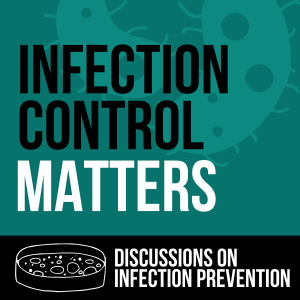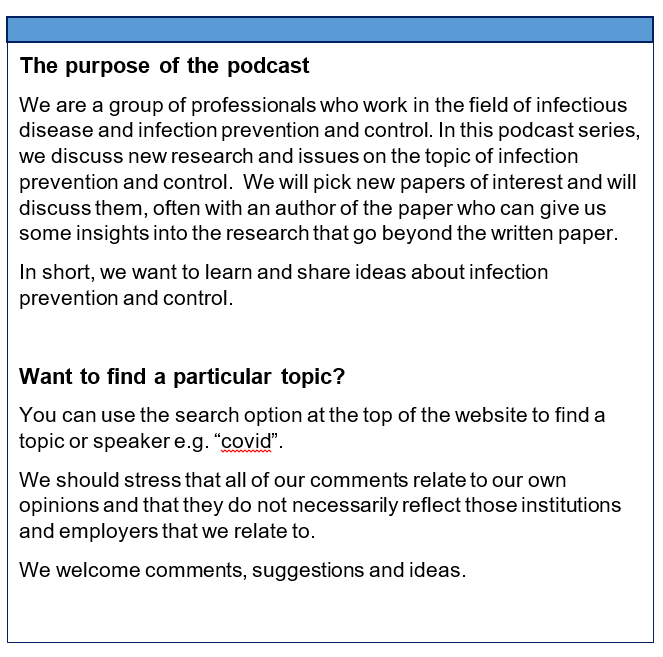Infection Control Matters
We are a group of professionals who work in the field of infectious disease and infection prevention and control. In this podcast series, we discuss new research and issues on the topic of infection prevention and control. We will pick new papers of interest and will discuss them, often with an author of the paper who can give us some insights into the research that go beyond the written paper. Authors will include nurses, doctors, academics, clinicians, administrators and leaders. We should stress that all of our comments relate to our own opinions and that they do not necessarily reflect those institutions and employers that we relate to. We welcome comment, suggestions and ideas. Please consider subscribing for updates and to find collections of topic specific podcasts at www.infectioncontrolmatters.com
Episodes

Monday Nov 21, 2022
Monday Nov 21, 2022
In this special episode for World Antimicrobial Awareness Week, Martin talks to UKHSA subject experts about the ESPAUR Report (English Surveillance Programme for Antimicrobial Utilisation and Resistance) released earlier today. You can find out more on the report at the ESPAUR webinar on 23rd November and can register here to attend: https://www.eventbrite.co.uk/e/espaur-report-2021-to-2022-webinar-tickets-439575370767
The UK Health Security Agency (UKHSA) is responsible for protecting every member of every community from the impact of infectious diseases, chemical, biological, radiological and nuclear incidents and other health threats. UKHSA provides intellectual, scientific and operational leadership at national and local level, as well as on the global stage, to make the nation's health secure.
UKHSA leads the English surveillance programme for antimicrobial utilisation and resistance. ESPAUR publish a report annually which includes national data on antimicrobial prescribing and resistance, antimicrobial stewardship implementation, and awareness activities. It is published here during World Antimicrobial Awareness Week.
https://www.gov.uk/government/publications/english-surveillance-programme-antimicrobial-utilisation-and-resistance-espaur-report
The national WAAW toolkit which includes a range of resources colleagues can use is available here https://www.gov.uk/government/publications/european-antibiotic-awareness-day-resources-toolkit-for-healthcare-professionals-in-england

Tuesday Nov 15, 2022
Tuesday Nov 15, 2022
In this episode, recorded live on stage in front of an audience at the Australasian College for Infection Prevention and Control (ACIPC) Conference being held in Sydney. Brett, Phil and Martin talk to Sally HAvers and Belinda Henderson about the challenges facing IPC workers in aged care in Australia and future priorities for IPC going forward in acute care.

Wednesday Nov 09, 2022
Wednesday Nov 09, 2022
In another discussion recorded at the Infection Prevention Society Conference in Bournemouth (UK), Martin and Brett chatted to Dr Annette Jeanes and Prof Jean-Yves Maillard. Annette formerly was the Director of IPC at University College London Hospital NHS Trust, and now works independently. We discuss her time working in the film industry during COVID, and how the varied skillset of an IP practitioner is transferable into what you might think of a completely alien setting. Following that discussion, we discuss the topic of environmental dry surface biofilms with Prof Jean-Yves Maillard from the School of Pharmacy and Pharmaceutical Sciences at Cardiff University in Wales. Jean-Yves is an experienced researcher in this field and presented the Tina Bradley Memorial lecture at the conference on this topic.

Wednesday Nov 02, 2022
Wednesday Nov 02, 2022
In this episode recorded at the Infection Prevention Society Conference in Bournemouth (UK), Martin talks to Dr Jon Otter (from Guy's and St Thomas' NHS Foundation Trust in London), where he is the joint Director of Infection Prevention and Control.
We discuss a paper that he gave at the conference on the topic of language and getting the message over. A copy of his excellent presentation complete with the references to the papers that we discuss can be found downloaded from here - https://jonotter.files.wordpress.com/2022/10/221013-2-ips-communication.pptx

Thursday Oct 27, 2022
Thursday Oct 27, 2022
In this first episode recorded at the Infection Prevention Society Conference (Bournemouth, UK) we talk to Dr Holly Slyne about how the Mouth Care Matters programme resulted in a reduction in C. difficile infections by way of reducing healthcare-associated pneumonias and antibiotic use. Holly has kindly shared some resources, please see links below.
Following that, Brett, Phil and Martin have a chat about the importance of face-to-face meetings and our conference highlights so far.
Health Education England Mouth Care Matters website: http://mouthcarematters.hee.nhs.uk/
Mouthcare matters poster courtesy of Dr Holly Slyne HERE
Mouthcare care plan courtesy of Dr Holly Slyne HERE

Wednesday Oct 19, 2022
Wednesday Oct 19, 2022
In this episode, Martin and Brett get views on contact/droplet/airborne transmission from an Engineer (Prof Cath Noakes) and a Physicist (Prof Lidia Morawska).
Prof Catherine Noakes OBE is Professor of Environmental Engineering for Building at the University of Leeds. She is a chartered mechanical engineer, with a background in fluid dynamics. Her teaching and research expertise is in building physics and environmental engineering and leading research into ventilation, indoor air quality and infection control in the built environment. Her internationally recognised group carry out experimental and modelling based studies, in particular to explore the transport of airborne pathogens, the influence of indoor airflows and effectiveness of engineering approaches to controlling airborne disease transmission. This include substantial research activity and policy advice relating to COVID-19 transmission. During the COVID-19 pandemic She co-chaired the Environment and Modelling sub group for the UK Scientific Advisory Group for Emergencies (SAGE) and contributed to multiple advisory groups and initiatives through IMechE, CIBSE, the Royal Academy of Engineering, the Academy of Medical Sciences, WHO, the NHS and several government departments.
Prof Lidia Morawska is Distinguished Professor at the School of Earth and Atmospheric Sciences, at the Queensland University of Technology and Director of the International Laboratory for Air Quality and Health (ILAQH) at QUT. Her work focuses on fundamental and applied research in the interdisciplinary field of air quality and its impact on human health, with a specific focus on atmospheric fine, ultrafine and nanoparticles. Since 2003, she expanded her interests to include also particles from human respiration activities and airborne infection transmission. In 2018, she received the Eureka Prize for Infectious Diseases Research, as well as the American Association for Aerosol Research (AAAR) 2017 David Sinclair Award. In 2020, she contributed to the area of airborne infection transmission of viruses, including COVID-19. In that same year she became a Fellow of the Australian Academy of Science (FAA) and received the 2021 International Society of Indoor Air Quality and Climate Special 2020 Award for an Extraordinary Academic Leadership. In 2021, she was included on Time magazine's list of the 100 most influential people in the world.

Friday Oct 14, 2022
Friday Oct 14, 2022
In this podcast, Phil, Martin and Brett try to summarise the key messages they heard from recent guests discussing contact, droplet and airbourne transmission.
What were the key points and similarities? Find out in this podcast.

Tuesday Oct 11, 2022
Tuesday Oct 11, 2022
In part 4 of this series on the current IPC paradigms of contact, droplet and airborne, we hear from a further range of guests on this topics.
This week we talk to:
Hilary Humphries (Ireland)
David Enoch (UK)
Jennie Wilson (UK)
Michael Borg (Malta)
Jon Otter (UK
Pierre Parneix (France)
If you haven't listened to the previous episodes in the series, please listen to them first.

Thursday Oct 06, 2022
Thursday Oct 06, 2022
In part 3 of this series on the current IPC paradigms of contact, droplet and airborne, we hear from a range of guests on this topics.
This week we talk to:
Marjia Juraja (Australia)
Egil Lingaas (Norway)
Ramon Shaban (Australia)
Elaine Cloutman-Green (England)
Christine Peters (Scotland)
If you haven't listened to the previous two episodes in the series, please listen to them first.

Thursday Oct 06, 2022
Thursday Oct 06, 2022
In this podcast, Brett, Phil and Martin discuss the current IPC paradigms of contact, droplet and airborne. Over the course of the next 3 podcasts, we will briefly talk to a range of people from across the world on their view on this topic. In this podcast, we introduce the topic and hear from our first two guests.
The purpose of this podcast is to hear a range of views, with the goal of moving this topic forward.
In this kick-off episode we also talk to
Kirsty Buising (Melbourne, Australia)
Kathy Dempsey (Sydney, Australia)

About us and contact
Feel free to contact us with suggestions on topics and or speakers. Use Twitter to contact any one or all of us:
Brett Mitchell @1healthau (Twitter link)
Martin Keirnan @emrsa15 (Twitter link)
Deb Friedman @friedmanndeb
Phil Russo: @PLR_aus (Twitter link)

Martin Kiernan: Martin is a highly experienced nurse who has worked in the field of infection prevention and control since 1990 in the acute hospital community and, more recently, in academic and industry settings with GAMA Healthcare. Martin's reputation as a research collaborator is recognised both nationally and internationally. Martin’s involvement in professional organisations such as the Infection Prevention Society and the Healthcare Infection Society has enhanced his reputation as a key opinion leader, teacher, leader, and researcher. As a result, he has been invited to act in leadership and mentoring roles to support his colleagues throughout the world in terms of infection prevention.

Professor Brett Mitchell: Brett is a Professor of Nursing with over 150 peer reviewed journal and oral conference presentations, authored several books, and has been an invited speaker at numerous infection prevention and control conferences in Australia and internationally. He is a Fellow of the Australasian College for Infection Prevention and Control and the Australian College of Nursing. Professor Mitchell is also Editor-in-Chief of Infection, Disease and Health. Professor Mitchell has experience leading nursing teams, research teams and infection prevention and control teams in both Australia and the United Kingdom. Further details: https://www.newcastle.edu.au/profile/brett-mitchell

Associate Professor Philip Russo: Phil is Director of Research, Nursing and Midwifery, Faculty of Medicine, Nursing and Health Sciences, Monash University, Victoria, Australia and Director of Nursing Research, Cabrini Health. A/Prof. Russo is the Past President of the Australasian College for Infection Prevention and Control. He has worked in both state and national positions, notably leading the establishment of the VICNISS Surveillance Program in Victoria followed by overseeing the successful implementation of the National Hand Hygiene Initiative sponsored by the Australian Commission for Safety and Quality in Health Care. Recently he has been an advisor at both a State and National level in the pandemic response. Further details: https://research.monash.edu/en/persons/philip-russo







